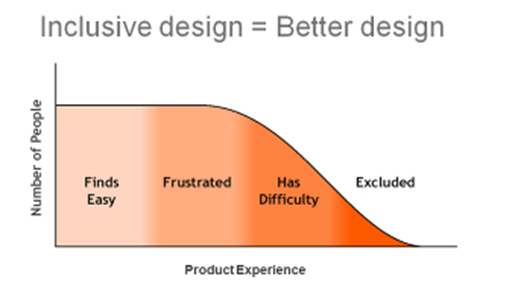European Inclusive Design Consortium
“Delight your customers with winning products”
Increase sales, reduce costs and improve their market
position through applying the principles of Inclusive Design
to your products and services.

Members of the ID2 consortium using University of Cambridge
simulation glasses and empathy gloves to evaluate a check-in
terminal at Heathrow Airport Terminal 2
What is Inclusive Design?
Inclusive Design can be defined as:
"The design of mainstream products and/or services that are
accessible to, and usable by, as many people as reasonably
possible....without the need for special adaptation or
specialised design"
Inclusive Design is neither a new genre of design, nor a
separate specialism. It is a novel approach to
designing in which designers ensure that their products and
services address the needs of the widest possible audience,
irrespective of age or ability. As illustrated below,
even where only a minority of people are excluded from using
a product or service, a significant additional set of people
may have difficulty or be frustrated when they try to use
it.

Companies such as Ford, BT, Nestlé, OXO Good Grips and BSkyB
have already successfully applied the principles of
Inclusive Design to their products.
Why is Inclusive Design important?
Many leading companies now have
excellent provision for people with single major
impairments, including wheelchair users and people who are
blind or deaf. Through our Inclusive Design consortia we are
helping companies take the next step in practically applying
Inclusive Design to mainstream products used by a much wider
set of consumers.
A key target for the programme is learning how to better
serve the large population of consumers who suffer from
'multiple minor impairments'. Many elderly people fall into
this category. There are already 130 million people over
fifty years old in the European Union - by 2020 one in two
European adults will be over this age. Designing products
that these people love to use is no longer just socially
responsible, it also makes sound economic sense.
Cambridge University Engineering Design Centre (EDC) is a
leading exponent of Inclusive Design in Europe. The CfBI has
recognised the scale of opportunity afforded by applying new
techniques in Inclusive Design to significantly improve the
competitive position of many products and services that
interface to the consumer.
CfBI and Inclusive Design
During 2016/17 CfBI has brought
together leading researchers and practitioners from the EDC
and elsewhere to deliver a third one-year consortium
programme (ID-3) where companies are learning together,
sharing experiences and receiving practical support in
exploiting this major new business opportunity. Its members
include: Nestlé, Transport for London, Proctor and Gamble,
GSK, RB, Smith & Nephew, BT and Stora Enso.
Work within ID-3 has included an enhancement to the EDC’s
unique Exclusion Calculator, undertaken by the University
for CfBI and ID-3 members.
The new Calculator enables designers to formally
assess the demand required to carry out a task (e.g.
unwrapping a product, getting onto a bus) across a full
range of human abilities, including vision, hearing,
cognition, reach and dexterity and mobility. It uses a
unique dataset which captures the occurrence of multiple
capability impairments across the UK population.
Members have also supported the re-profiling of the
dataset to suit populations in other geographies, including
American and Far East nations.
The Calculator outputs the percentage of the selected
population that would be excluded from carrying out the
task, due to the demand required exceeding their
capabilities. Designers can use this information to
direct their attention to changes which will include the
maximum number of potential customers at minimum cost.
Previous projects have actually shown that inclusively
designed products can come out cheaper than previous
versions – often through simplification of the design by
removing elements of the product or its packaging.
The ID-3 Consortium has extended the current Calculator to
allow whole User Journeys to be analysed in detail and
percentage population exclusions to be calculated.
This allows designers to evaluate alternative design options
for products and services much faster than has previously
been possible.
See here for a free version of the
new Calculator, the full version of which is available only
to ID-3 members and licensees.
https://www.inclusivedesigntoolkit.com/exclusioncalc/exclusioncalc.html
Join our fourth Inclusive Design Consortium
The fourth Inclusive Design Consortium (ID-4) is now in
planning for launch in the second half of 2017. ID-4
members will gain access to the new Calculator and will
define further enhancements.
They will also propose and steer projects to deliver
Inclusive Design tools and solutions to meet their needs.
Meetings will include presentations and workshops
from eminent European design practitioners.
Companies joining the Consortium can expect to make back the
cost of participation (including cost of staff time) through
increased sales and/or reduced costs of their first
Inclusively Designed product.
Participation in the Consortium can form part of an
integrated staff training and development programme,
delivering valuable new skills within existing budget
allocations.
Contact Rob Morland
e:
rob.morland@cfbi.com
m: +44 (0) 7775 918263


